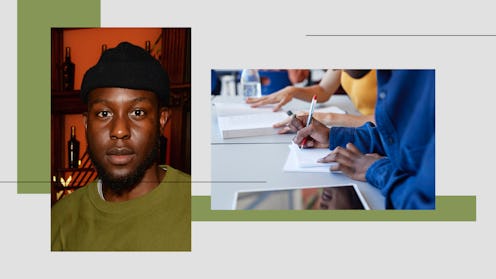Social Justice
Caleb Femi On Rethinking & Rebuilding Our Education System
As part of BBC's Rethink series, the poet and director explains what his generation most urgently needs from the post-pandemic world.

Why is our education system still tied to arbitrary, outdated measures of evaluation? This is one of the questions raised in Caleb Femi's essay for BBC Radio 4's Rethink series, which looks at how the world should change in the wake of the coronavirus pandemic. When COVID-19 hit, tests scores and coursework went out the window as students were left to rely on yet another system that has consistently failed them: predicted grades. Clearly something needs to change, and coronavirus could be a blessing in disguise when it comes to schooling and assessment, allowing us to pause, rethink, and rebuild from the ground up. As we continue to reflect on the idea of new beginnings at Bustle, here is Femi’s Rethink essay, in full.
The British education system has covered itself in a veil for centuries. The veil is the promise that, at the end of the road of education, there is security and even prosperity. We are told to trim the fat of our potential. Students turned up every morning for 39 weeks a year, they studied and they learned for tests and they sat those tests. They shrunk their imagination and the autonomy of the learning process because there was that promise. And that promise was that you leave with a qualification, an emblem that said you were a capable member of society. This was the veil.
"The British education system has covered itself in a veil for centuries."
But COVID-19 was the storm that tore that veil apart from these students in the UK. See, when the lockdown was instated schools had to close and GCSE students, year 11s, year 10s, some year 9s, and A level students, in the middle of their exam prep, were told that they wouldn’t be able to take their tests.
Now, imagine that. Years of classroom exercises, homework, coursework, mock tests, parents evenings, god! Parents evenings. Sacrificing so much because of that promise of a qualification, of security. Instead your worth, that value of your qualification, your supposed future prospects, is based on an inaccurate calculation of what is called your predicted grade.
Take note that statistically Black students are underpredicted and generally exceed their predicted grades in their real exams.
"Take note that statistically Black students are underpredicted and generally exceed their predicted grades."
So what many students learnt during this lockdown period is that society is an uncertain landscape, job sectors are volatile. And then they begin to question themselves. They question the tools that they have to be able to survive in the wild that is adulthood. You don’t have to be David Attenborough to know that absolute security does not exist in nature.
The ones who survive, the ones who thrive, are the ones who have the tools who have the skills to adapt. So as a student, you then question yourself: do I have the tools that is required to survive in this society? These tools are problem solving, they are creativity, innovation, the autonomy to envisage a new possibility, a new future. The mental dexterity to make careers of yourself, to make society a better place, a more efficient place, a more equal place for everyone. The tools that you need to survive in such an uncertain landscape don’t match up.
"What many students learnt during this lockdown period is that society is an uncertain landscape."
Going forward it means that it's ultimately a job for you, the individual, alongside with your community, to think in ways that puts you at the driving seat of your own learning, new approaches need to be made where students are encouraged to think creatively, to exercise their imagination, to problem solve in unique innovative exciting ways. That is what a post lockdown relationship should look like.
You can listen to Femi's reading of his Rethink essay on BBC Sounds here.